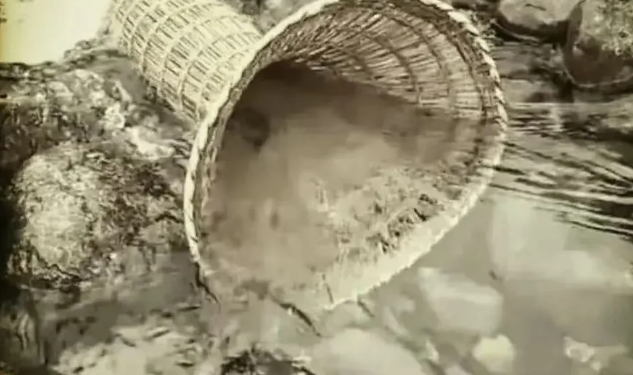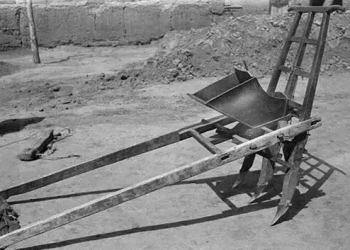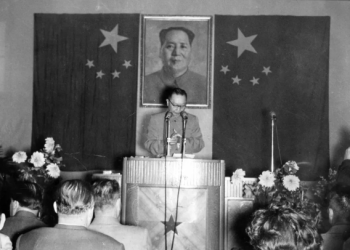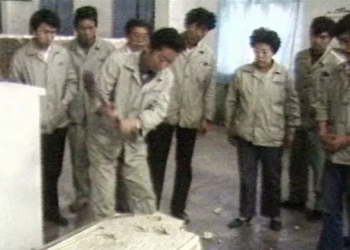In the depths of my memory, childhood remains a time filled with laughter and carefree moments. Among all the beautiful memories from those days, what I remember most vividly are the times spent with my friends, fishing with the fish basket. This seemingly simple but ingeniously designed fishing tool was like a key that opened the door to the joyous moments of my youth.
There were two types of fish baskets: the large ones for catching carp, crucian carp, and small river fish in the creeks and ditches, and the small ones for catching loaches and mudfish in the rice fields. Every morning, as the first light of dawn appeared in the sky, I would set off with my friends, carrying the large fish baskets on our backs, walking along the rural paths, full of anticipation, towards the little streams and ditches. The winding path was lined with lush green rice fields, and the air was filled with the fragrance of soil and flowers. Everything seemed so peaceful and beautiful.

The small river and ditch became our primary battlefield. We would seek out spots where the water was calm and the weeds were abundant because the fish loved to play in these places. Once we found the right spot, we would get to work, using stones and mud to block the water flow, leaving only a gap through which we could place the fish basket to allow the water to flow. The design of the fish basket was truly ingenious. It was narrow at both ends and wider in the middle, with an entrance on one side. Once the fish swam inside, they couldn’t escape. However, the basket had ample space, and as long as there was water inside, the fish could swim freely without fear. The other end of the basket was tightly sealed with a bamboo strip, and when it was time to collect the fish, all we had to do was remove the bamboo, and the fish would jump out on their own. Watching the fish happily swim in the basket, our hearts were filled with joy.
After setting the fish baskets in place, we wouldn’t just sit idly by. Instead, we would take this time to gather pigweed, playing a game called “Three-Legged Rack” along the way. This was a simple yet fun game where we would use branches to form a three-legged structure and place the pigweed beneath it as a stake. The goal was to knock down the structure and claim the pigweed underneath. The game not only tested our strength and skill but also helped us build stronger bonds of friendship. Every time someone managed to knock down the rack, we would cheer and clap for the winner.
Sometimes, we would also explore the riverbanks, looking for holes where we might find some frogs, toads, or crabs. I remember one time when my friend Tingting and I were checking the holes by the river, he suddenly grabbed a snake. At that moment, we were so terrified that we ran away as fast as we could. Thankfully, it turned out to be a harmless water snake. In retrospect, that experience, though frightening, became one of the most thrilling and unforgettable moments of our childhood. After that, we never dared to check the holes by the river again. Occasionally, we would also try to catch carp and stone fish in the cracks between the river stones. I wasn’t particularly good at this, but Tingting was a master.

Our catch from the ditches ranged from three or four kilograms on a good day to just a handful on other days. When it was time to divide the fish, Tingting always made sure I got a little more. My heart was filled with gratitude and joy. The lively fish reminded us of the joy of labor and the thrill of harvesting. When our parents saw the fish we brought back, they always smiled from ear to ear, knowing that the family would have a big feast.
In the evening, I would follow my older brother to the rice fields near the village, setting up small fish baskets to catch fish. We would crush earthworms and rice bran to make bait, then place the baskets flat in the rice fields, securing them with mud, and marking the spot with small wooden sticks. My family owned over thirty fish baskets, and for each section of the rice field, we would set up between six and ten baskets. At that time, it felt like we were setting up secret traps, hoping that the next day we would catch a full bounty of fish. The excitement and anticipation from those moments still linger in my heart today.
The next morning, at the first light of dawn, my brother and I would eagerly head out to collect the fish baskets. Following the marks we had made, we checked each section of the rice field, retrieving each basket one by one. Some baskets would make a clattering sound when lifted, filled with lively loaches and a few mudfish. Others might only contain a few loaches. But no matter how much we caught, we were always overjoyed. On days when we caught more fish, we would sell them at the market to buy rice; on days when the catch was smaller, we would enjoy them ourselves, improving our meals.
Today, whenever I think back on those childhood days spent fishing with the baskets, my heart fills with warmth and nostalgia. The fish we caught not only nourished my body but also enriched my soul. They taught me an important lesson: the beauty of life often lies in the small, seemingly mundane moments that are filled with joy. And the friends who accompanied me through those wonderful times have become the most precious memories of my life. They taught me the value of friendship, and how in life, we must support each other and move forward together











